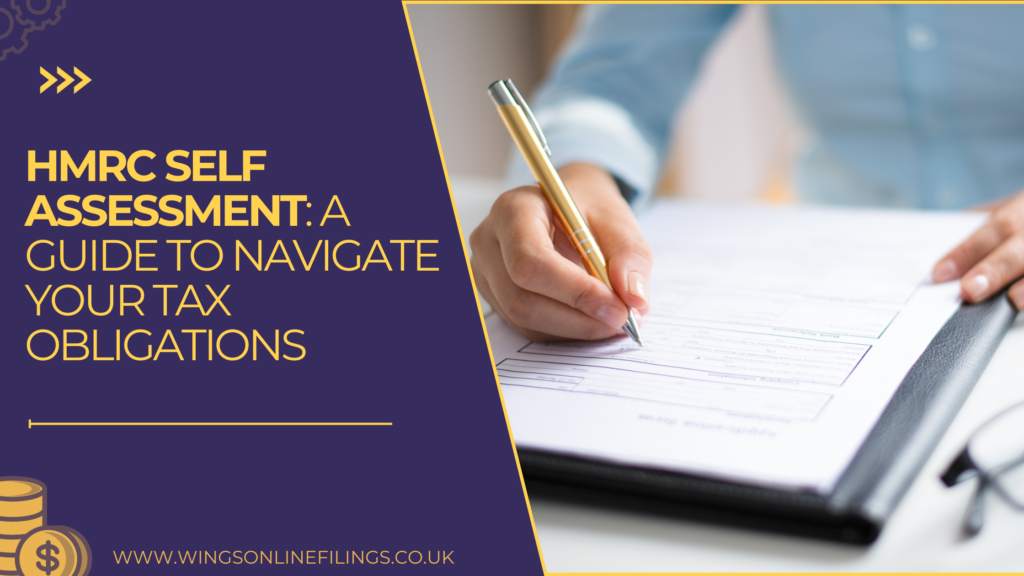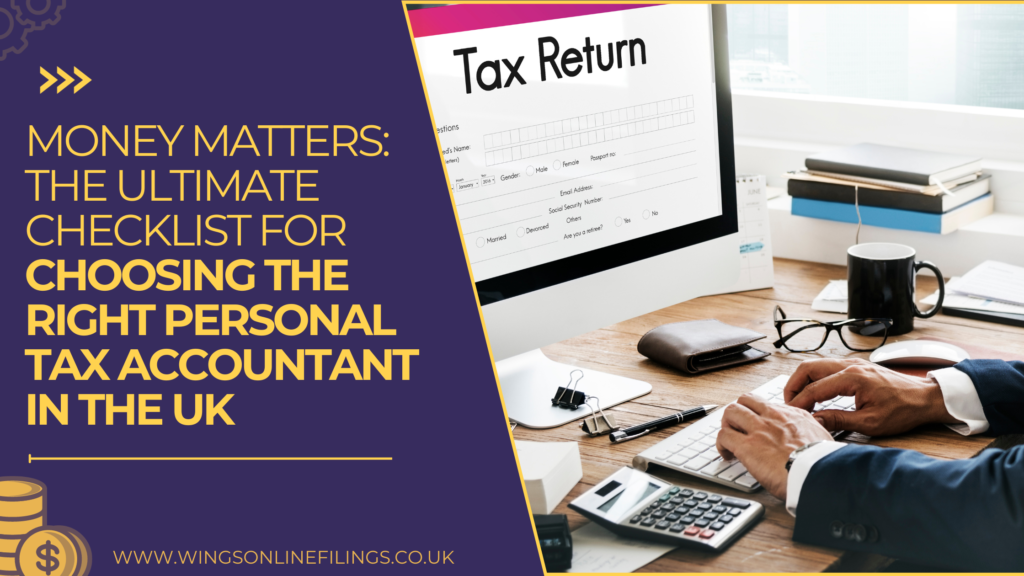
Introduction
Self-assessment is a process where individuals declare their income and expenses to HM Revenue and Customs (HMRC). This isn’t a one-size-fits-all obligation; it applies to those whose financial affairs are more complex. If you’re self-employed, a business owner, or earn income beyond a standard salary, self-assessment is likely in your future.
Who needs to submit a HMRC self assessment tax return?
Curious about whether you should submit a self-assessment tax return to HMRC? Let’s clarify. Here’s an overview of those obligated to file a self-assessment tax return with HMRC.
Self-Employed & Sole Traders: If you work independently or manage a business, filing a tax return is likely necessary.
High Earners: Individuals earning over £100,000 or with diverse income sources, including investments, must file a return.
Property Owners: If you earn rental income or have engaged in property transactions, reporting your finances is mandatory.
Directors of Companies: Directors typically need to file a tax return, even if not self-employed.
Landlords: Those earning income from property rentals usually need to file a tax return.
Partners of Partnership Firms: Partners in a partnership firm usually need to file a tax return.
Individuals with Complex Tax Affairs: Those with intricate tax situations, such as offshore income or significant capital gains, are advised to file a tax return.
While this list isn’t exhaustive, we delve into specific categories required to complete a self-assessment tax return.
You can Check here on UK Government official website if you need to send a Self Assessment tax return
If the tool suggests no need for a tax return but HMRC issues notice, requesting cancellation is crucial to avoid penalties. Proactive communication with HMRC ensures compliance and prevents potential charges.
Is it necessary to fill out a self assessment tax return if I don’t owe any taxes?
Yes, even if you have no tax to pay, you may still be required to complete a self-assessment tax return in the UK. Certain circumstances, such as being self-employed, earning income from property, or receiving other untaxed income, can mandate the need for a tax return submission. Even if you fall below the taxable income threshold, fulfilling the self-assessment requirement ensures that your financial information is accurately reported to HM Revenue and Customs (HMRC). It’s essential to stay informed about your tax obligations and comply with the necessary filing procedures, regardless of your tax liability.
Registration for HMRC self assessment
To register for self-assessment with HMRC, you need to follow a straightforward process. Visit the HMRC website and navigate to the “Register for and file your Self Assessment tax return” section. Complete the online registration form, providing accurate details about your income, employment, and any other relevant financial information. Ensure you have your National Insurance number and other necessary documents on hand.
The deadline for registering for self-assessment is by 5th October in the tax year after the one you need to file for. For example, if you need to file for the tax year ending on 5th April 2023, you should register by 5th October 2023. It’s crucial to register on time to avoid penalties and ensure you have ample time to complete and submit your tax return.
If you find difficulty in registration for self-assessment tax return contact us here for assistance.
Deadline for filing of HMRC self assessment tax return
The deadline for filing your HMRC self-assessment tax return in the UK is 31st January following the end of the tax year. For example, if the tax year ends on 5th April 2023, the deadline for filing your self-assessment tax return for that year would be 31st January 2024. It’s crucial to submit your tax return by this date to avoid late-filing penalties. Additionally, if you owe any tax, it must be paid by the same deadline to prevent further penalties and interest charges. Staying mindful of this deadline ensures compliance with HMRC regulations and helps manage your tax responsibilities effectively.
Penalties for late filing of HMRC self assessment tax return
Ensuring the punctual and accurate submission of your UK self-assessment tax return is paramount. HM Revenue and Customs (HMRC) enforces an annual deadline, typically on January 31st. Missing this date results in penalties, carrying significant financial consequences.
1 Day Late: Incurs an automatic fixed penalty of £100, applicable irrespective of tax liability. This penalty activates if the filing is overdue by January 31.
3 Months Late: Imposes a daily fine of £10, up to a maximum of £900 over 90 days.
6 Months Late: Levies £300 or 5% of the tax owed, whichever is higher.
12 Months Late: Applies an additional £300 or 5% of the tax owed, whichever is higher.
Further penalties may be imposed for deliberate or concealed information withholding beyond 12 months.
Crucially, these penalties accumulate. Thus, the minimum late filing penalty for a tax return 12 months overdue stands at £1,600, depending on the tax liability. Timely filing is imperative to evade these financial repercussions.
Submitting your self-assessment tax return promptly is not just a best practice; it’s vital for financial stability. Understanding HMRC’s penalties for late filings is essential for meeting obligations and averting financial strain. Stay informed, organized, and file your taxes on time for a smooth tax season. If you require professional assistance, feel free to reach out to us.
Information need to file HMRC self assessment tax return
To file your HMRC self-assessment tax return in the UK, you’ll need several pieces of information. Here’s a comprehensive list:
Details of all income sources (employment, self-employment, pensions, savings, dividends, etc.)
Records of any benefits received
Information about additional income or capital gains
P11D form for any additional benefits received from your employer
Records of income and expenses
Bank statements
Invoices and receipts
Rental income details
Expenses related to property ownership
Details of dividends received
Information about any shares or investments sold
Details of any personal or workplace pension contributions
Student Loan Information
If you’ve made any charitable donations, keep records for Gift Aid claims
Unique Tax Reference (UTR) Number
Access details for your HMRC online account (if filing online)
Ensure that you have all these details gathered and organized before attempting to file your self-assessment tax return. Keeping accurate records and submitting the information on time will help you meet HMRC requirements and avoid potential penalties.
How can I figure out my HMRC self assessment bill?
A crucial aspect of the Self Assessment process involves computing your own tax, along with potential National Insurance and student loan repayments, for the tax year and documenting this in your tax return. This task need not be as intimidating as it may seem.
The process varies slightly depending on whether you submit your return online or on paper. Regardless of the method chosen, reviewing the calculation yourself is beneficial in catching any errors, be they yours or occasionally from HMRC.
For online returns, HMRC’s system (or third-party software if preferred) will automatically determine the amount owed. If opting for a paper return, HMRC will assess your liability based on the entries and provide you with the tax calculation. As long as the paper return is submitted by the due date, HMRC commits to informing you of the necessary payment before it’s due.
However, submitting a paper return late introduces uncertainty. While HMRC will still perform the calculation, they can’t guarantee it will be completed in time for you to make the correct payment by the due date. Consequently, late submission of a paper tax return risks a delayed Self Assessment payment, potentially incurring penalties and interest, in addition to late filing penalties.
Deadline for payment of HMRC self assessment tax bill
The deadline for the payment of your Self Assessment tax bill in the UK is January 31st. This date applies to the tax year that ended on the previous April 5th. It’s crucial to ensure that your payment reaches HM Revenue and Customs (HMRC) by this deadline to avoid any late payment penalties or interest charges. Timely payment is essential for maintaining compliance with tax regulations and avoiding any financial repercussions. If you have any concerns or difficulties meeting this deadline, it’s advisable to contact HMRC as early as possible to discuss your situation and explore any available options.
Amendment in HMRC self assessment tax return
You can amend your Self Assessment tax return in the UK after you have submitted it. If you realize there are errors or if your circumstances change, it’s important to make corrections promptly. It’s important to note that you can amend your tax return within a certain time frame, usually within 12 months of the original deadline for filing the return. Making corrections promptly helps you avoid potential penalties and ensures that your tax affairs are accurate and up to date. If you have questions or encounter challenges during the amendment process, consider reaching out to HMRC or seeking professional advice.
What is Payment on Account (PoA)?
Payment on Account is a system within the UK Self Assessment tax return process designed by HMRC. For those with tax liabilities exceeding £1,000, it entails making two advanced payments towards the upcoming tax year’s bill. These payments are typically due in January and July, each representing half of the previous year’s tax liability. While this system assists in spreading the financial burden, it’s essential to note that these payments are based on the previous year’s earnings. If your income decreases in the current tax year, you might end up overpaying. Conversely, if your income increases, you might find yourself with an additional tax bill. Regularly reviewing your financial circumstances is crucial to ensure accurate and fair payments through the Payment on Account system.

Conclusion
In wrapping up, navigating the intricacies of the UK self-assessment tax return is not only a legal obligation but a crucial aspect of maintaining financial clarity and compliance. Whether you’re self-employed, a business owner, or have diverse income sources, understanding the process and meeting deadlines is paramount.
Timely and accurate filing is not just about avoiding penalties; it’s about ensuring your financial well-being. Delving into the details of your tax situation, from allowable expenses to potential liabilities, empowers you to make informed decisions and fosters a proactive approach to your finances.
As you embark on your self-assessment journey, remember that staying informed is your greatest ally. Utilize the official resources provided by HMRC to clarify any uncertainties and ensure a smooth filing process.
Some Important Links:
HMRC YouTube channel
HMRC Twitter Handle
Gov.UK
HMRC Community Forum

